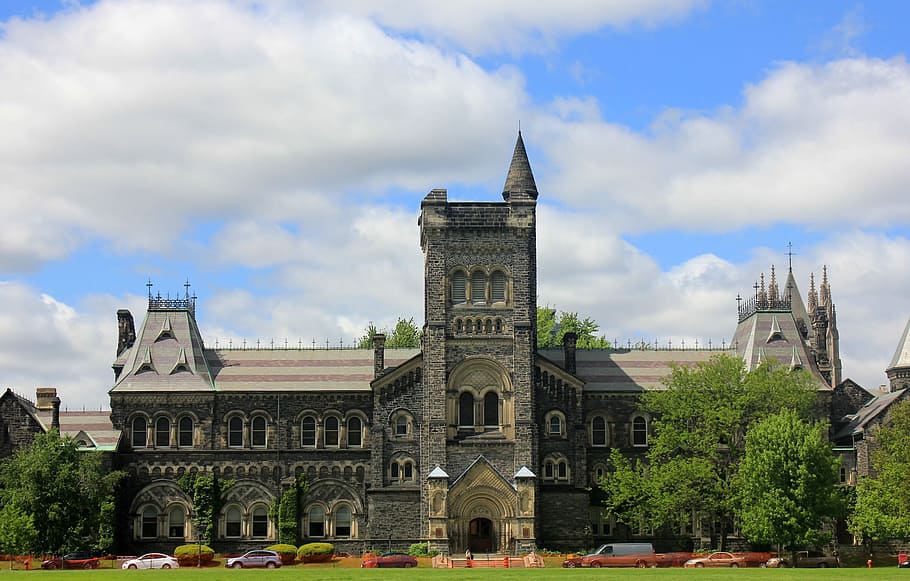Total undergraduates
5,000
International tuition fee
$60,000
School address
105 ST. GEORGE ST
Online or distance education
Yes
Number of graduate programs
280
Number of undergraduate programs
200
Number of graduate students
900
Number of undergraduate students
6,000
Study method
Full-time,continuing
Quick facts about our school
The University of Toronto offers a prestigious Ph.D. program with a strong emphasis on research excellence and academic rigor. As one of the top-ranked universities in the world, the University of Toronto provides Ph.D. students with access to leading experts in their field, state-of-the-art facilities, and a vibrant intellectual community. The program is designed to develop students into independent scholars capable of conducting original and impactful research that contributes to their respective fields.
Ph.D. students at the University of Toronto have the opportunity to engage in interdisciplinary collaborations, attend conferences, publish their work, and gain teaching experience. With a diverse and inclusive campus environment, students benefit from a supportive community that fosters creativity, critical thinking, and innovation. Graduates of the University of Toronto's Ph.D. program are well-equipped to pursue successful careers in academia, industry, government, and beyond.
School highlights
Life at our school
Life at the University of Toronto for PhD students is a dynamic and enriching experience. As a top-ranked research institution, students have access to cutting-edge resources and collaborations that foster innovation and academic growth. The diverse and inclusive community at U of T fosters a vibrant academic environment where students are encouraged to pursue their research interests and engage in interdisciplinary studies.
Moreover, the University of Toronto offers a range of opportunities for professional development and networking, preparing students for successful careers in academia and beyond. The campus is located in the heart of Toronto, providing easy access to cultural events, entertainment, and a bustling city life. With a supportive faculty and a close-knit community of fellow researchers, PhD students at U of T are well-equipped to excel in their academic pursuits and make a positive impact on society.
The University of Toronto offers a prestigious Ph.D. program that is renowned for its academic rigor and commitment to excellence. As one of Canada's top research institutions, the university boasts a diverse and vibrant community of scholars, researchers, and students from around the world. With a strong emphasis on innovative research, interdisciplinary collaboration, and academic diversity, the University of Toronto Ph.D. program provides a dynamic and stimulating environment for scholars to pursue their academic goals and make meaningful contributions to their respective fields. Graduates of the program are well-equipped to excel in their chosen professions and make a meaningful impact on society.
The University of Toronto offers a PhD program focused on the sustainable future, providing students with the necessary knowledge and skills to address global challenges related to environmental sustainability, social equity, and economic development. This interdisciplinary program emphasizes research in areas such as renewable energy technologies, sustainable resource management, climate change mitigation, and sustainable urban development. Students have the opportunity to collaborate with leading experts in the field and engage in cutting-edge research initiatives to develop innovative solutions for a more sustainable future. By combining theoretical knowledge with hands-on experience, graduates of the program are well-equipped to make a meaningful impact in promoting sustainability and driving positive change on a global scale.
The Overview Vision at University of Toronto PhD program is to provide a transformative and innovative educational experience that prepares graduates to address complex challenges and make significant contributions to their fields of study and society as a whole.
Key points:
- Emphasis on cutting-edge research and interdisciplinary collaboration
- Commitment to producing graduates who are proficient in their chosen areas of study and capable of pushing the boundaries of knowledge
- Focus on fostering creativity, critical thinking, and problem-solving skills
- Promotion of diversity, inclusivity, and global perspectives in research and scholarship
- Strong partnerships with industry, government, and community organizations to facilitate real-world impact of research
- Dedication to providing students with the resources, mentorship, and support needed to succeed in their academic and professional pursuits.
The campus experience at the University of Toronto for PhD students is highly enriching and vibrant. With its beautiful and sprawling campus located in the heart of downtown Toronto, students have access to top-notch facilities, resources, and a diverse community of scholars and researchers. The university offers a wide range of academic programs and opportunities for interdisciplinary collaboration, allowing students to engage in cutting-edge research and contribute to knowledge creation in their respective fields.
Moreover, the University of Toronto provides numerous extracurricular activities, cultural events, and networking opportunities that enrich the overall campus experience for PhD students. From seminars and workshops to social events and student clubs, there is always something happening on campus to engage and inspire students. Additionally, the university's central location in Toronto provides easy access to the city's vibrant cultural scene, restaurants, and recreational activities, further enhancing the overall experience for PhD students.
Programs offered at our schools
The University of Toronto offers a wide range of doctoral programs across various disciplines for students seeking to pursue a Ph.D. degree. With its distinguished faculty and world-class research facilities, the university provides opportunities for advanced study in fields such as engineering, humanities, social sciences, and health sciences. The graduate programs at the University of Toronto emphasize cutting-edge research, interdisciplinary collaboration, and academic excellence, preparing students for successful careers in academia and industry. Additionally, the university boasts a vibrant academic community and a supportive environment for graduate students to thrive and contribute to groundbreaking research in their respective fields.
Admission to the PhD program at the University of Toronto is highly selective and competitive. Prospective students must first meet the minimum eligibility criteria, which typically include a strong academic background, relevant work experience, and demonstrated research capabilities. Additionally, applicants are required to submit a well-crafted statement of purpose outlining their research interests, career goals, and reasons for pursuing a PhD at the university. Letters of recommendation from academic or professional references, as well as a strong academic writing sample, are also crucial components of the application. The admissions committee carefully reviews each application to assess the candidate's potential for success in the program and contribution to the university's research community.
The University of Toronto offers a variety of undergraduate programs for prospective students interested in pursuing a Ph.D. Students seeking admission to the Ph.D. program can apply through the university's centralized application system, which typically requires a strong academic background, letters of recommendation, a personal statement, and standardized test scores. The university's admissions committee carefully reviews each application to ensure that potential Ph.D. candidates demonstrate the necessary skills and qualifications for successful doctoral studies at one of the top research institutions in Canada. The University of Toronto provides a supportive and stimulating academic environment for Ph.D. students, offering access to world-class faculty, state-of-the-art research facilities, and a vibrant scholarly community.
The University of Toronto is one of Canada's top institutions for higher education, internationally recognized for its research and academic programs. The admissions process for undergraduate programs at the University of Toronto is highly competitive, with a strong emphasis on academic excellence and a well-rounded application. Prospective students are required to submit high school transcripts, standardized test scores, letters of recommendation, and a personal statement. Additionally, some programs may require supplementary materials such as portfolios or auditions for specific areas of study. The University of Toronto aims to create a diverse and dynamic student body, and admission decisions are based on a holistic review of each applicant's academic background, extracurricular involvement, and potential for success at the university level.
The admission process for a Ph.D. program at the University of Toronto typically involves the following steps:
1. Submitting an online application through the university's admissions portal.
2. Providing official transcripts from all post-secondary institutions attended.
3. Submitting letters of recommendation from academic referees who can attest to the applicant's research abilities and potential for success in a doctoral program.
4. Writing a statement of purpose outlining the applicant's research interests, career goals, and reasons for pursuing a Ph.D. at the University of Toronto.
5. Taking any required standardized tests, such as the GRE or GMAT, and meeting minimum score requirements.
6. Demonstrating proficiency in the English language by submitting TOEFL or IELTS scores for non-native English speakers.
7. Contacting potential supervisors in the applicant's field of study to discuss research interests and potential fit within their research group.
Remember to check the specific requirements and deadlines for the Ph.D. program you are interested in at the University of Toronto, as they may vary depending on the department or faculty.
The admission requirements for the Ph.D. program at the University of Toronto typically include a completed master's degree in a related field from a recognized institution, strong academic transcripts demonstrating a minimum GPA requirement (usually around 3.0 or higher on a 4.0 scale), letters of recommendation from professors or professionals familiar with the applicant's academic work and potential, a well-written statement of purpose outlining the applicant's research interests and goals, and standardized test scores such as the GRE or GMAT. Additionally, some programs may require a writing sample, a resume or curriculum vitae, and/or proof of English language proficiency for international applicants. Meeting these requirements can significantly strengthen an applicant's chances of being admitted to the Ph.D. program at the University of Toronto.
The admission deadline for the PhD program at the University of Toronto varies depending on the specific department and program. Generally, the deadline for most PhD programs at the University of Toronto is between the months of December and January for September entry. It is important for prospective applicants to check the specific deadline for the program they are interested in and make sure to submit all required materials before the deadline to be considered for admission.
Please note that deadlines may vary for international applicants, so it is advisable to check the official University of Toronto website or contact the admissions office for the most up-to-date and accurate information regarding admission deadlines for the PhD program. Meeting the deadline is crucial in order to increase your chances of being considered for admission to the prestigious University of Toronto for your PhD studies.
The University of Toronto offers a variety of scholarships and financial aid options for students pursuing a PhD. These opportunities include external awards, internal scholarships, fellowships, and assistantships. The School of Graduate Studies at the University of Toronto also provides information and resources on available funding sources, as well as guidance on how to apply for financial assistance.
Students can explore different avenues to fund their PhD studies at the University of Toronto, including research grants, bursaries, and work-study programs. The university is committed to supporting its students in their academic pursuits and offers numerous opportunities to alleviate financial burdens. By leveraging these resources, students can focus on their research and academic endeavors without worrying about financial constraints.
-
International students
-
Canadian students
-
Provincial students
Notes for the international students
See scholarships and other financial award programs on our website Also, see employment opportunities available to our international students
Keep in mind that the above are just rough estimates; the actual tuition fees vary widely, depending on many factors For a better estimate for YOU, please contact us
Managing finances as a Ph.D. student at University of Toronto requires careful planning and discipline. One important step is creating a budget to track your income and expenses. This will help you prioritize your spending and ensure that you can cover essentials like tuition, rent, and food. Look for opportunities to save money, such as buying used textbooks, cooking meals at home, and taking advantage of student discounts.
Additionally, consider exploring part-time job opportunities or freelance work to supplement your income. Many Ph.D. students also qualify for research assistantships or teaching assistant positions that offer a stipend or tuition remission. It's important to prioritize your financial well-being and avoid unnecessary debt, so be mindful of your spending habits and seek out resources for financial aid or support if needed. By being proactive and responsible with your finances, you can ensure a more stable and stress-free academic experience at University of Toronto.
At the University of Toronto, students have the opportunity to work both on-campus and off-campus while studying. On-campus job opportunities are available within the university itself, such as working at the library, student services, or campus cafes. These jobs often offer flexibility in terms of working hours and can be a great way to earn some extra income while gaining valuable work experience.
For off-campus work, international students studying at the University of Toronto may be eligible to work off-campus up to 20 hours per week during the academic year and full-time during scheduled breaks. This allows students to explore employment opportunities in the surrounding community and gain additional experience in their field of study. It's important for students to check with the university's international student services office to ensure they are following the necessary guidelines and regulations for working off-campus.
Overall, balancing work and study can be challenging but also rewarding for students at the University of Toronto. By effectively managing their time and prioritizing their commitments, students can successfully juggle their academic responsibilities with part-time work to enhance their overall university experience.
Where does the financial assistance come from? Universities, the federal, provincial and territorial governments, individual schools, some businesses and charitable foundations give out bursaries and scholarships. Amazingly enough, over 100,000 scholarships are awarded every year, with many millions of dollars of available funds still going unclaimed because no one applies. Whether you are Canadian or an International student, you can apply for Bursaries and Sponsorships for a range of undergraduate, graduate, doctoral and post-doctoral courses at a wide range of universities so why not check with your chosen school when you apply?
If you are looking for a scholarship or financial aid for your studies, there are literally hundreds of online sources, with both government funding and private funds available. What you don’t want to fall victim to is some sort of scam, which may ask you to pay for the service of applying for a scholarship or even asking you for some sort of deposit. Here are some useful tips if you want to avoid scamming altogether.1- Remember - no authorised and responsible institution will charge you anything for enquiring about financial aid, or for applying for funds. 2- Money up front/ Application Fee - Never send money up front for an application fee - if you are asked to do so, this is definitely a scam!.3- Loan Fees - When applying for a loan, if a company asks you for a loan fee before they will release the money to you, don't go through with it. Companies add fees to your loan balance and would never ask you to pay upfront.4- Guaranteed Scholarships - There is no such thing as a guaranteed scholarship and any company that says they will guarantee you one on payment of a fee will never get back to you. 5- Company/ Scholarship Names - If you see a scholarship service or company that is using words like 'official', 'national', 'government' or other governmental or official sounding names be careful. They are most probably trying to sound official to cover up the scam.6- Phishing schemes - It may be that you get an email, a phone call or an SMS message, asking you for details like your name, address, social security number etc, along with a link to an application form on a website. This is actually a “phishing site” designed to steal your information. In general, you should never give your personal details to anyone, unless you trust them implicitly!.7- Lottery-based scholarships - If you are asked to complete a survey in return for entry into a prize draw (the prize being a scholarship) be very careful. The company providing the scholarship is making money off the information you provide by selling it to third parties. Your chances of winning are very slim and are not based on merit.8- Ask yourself, 'Is it too good to be true?' Although you may want to believe that your dream has just come true, use your common sense and do some research on the organisation involved.9- In general, never pay money - Things like application fees and service fees will be free for legitimate scholarships and you will never be asked to pay money.10- Check them out - If you have a scholarship offer that is asking for money up front, contact them personally. Real companies will be transparent in their services, location etc while scammers will usually be hard to get hold of.Lastly, always make sure that you are applying to an authorised university and that you go through their official channels when you send your personal details. You can find a comprehensive list of secondary education institutions on UniRank
Studying for a Ph.D. at University of Toronto can be a significant financial investment. Tuition fees for Ph.D. programs can vary depending on the field of study, but are generally higher for international students compared to domestic students. It is important for prospective Ph.D. students to consider additional costs such as accommodation, living expenses, health insurance, and other personal expenses when planning their budget. Funding opportunities, such as scholarships, grants, and assistantship positions, may be available to help offset some of the costs associated with pursuing a Ph.D. degree at University of Toronto. It is advisable for students to carefully research and explore these financial options to ensure a smooth and financially manageable academic journey.
The University of Toronto offers entrance scholarships for PhD students to support their academic pursuits. These scholarships are awarded based on academic merit, research potential, and other criteria determined by the specific graduate department or program. Students who are admitted to a PhD program at the University of Toronto may automatically be considered for these scholarships, although some programs may require a separate application. Entrance scholarships can provide financial support to help cover tuition fees, living expenses, and research costs, allowing students to focus on their studies and research without the added stress of financial burden. These scholarships also serve as a recognition of the students' outstanding achievements and potential in their field of study, motivating them to continue excelling in their academic and research endeavors.
The University of Toronto offers entrance scholarships for PhD students to help support and attract top talent to their programs. These scholarships are awarded based on academic merit, research potential, and overall excellence demonstrated by the applicants. By receiving an entrance scholarship, students are provided with financial support to help cover tuition fees, living expenses, and research costs during their studies. This recognition also serves as a testament to the students' academic achievements and potential contributions to research in their field. Overall, entrance scholarships at the University of Toronto for PhD students are a valuable opportunity to support and encourage promising scholars in their educational journey towards advanced research and academic excellence.
Merit scholarships are highly sought after forms of financial aid that are awarded based on a student's academic achievements, extracurricular activities, leadership qualities, and other accomplishments. At University of Toronto, PhD students have the opportunity to apply for various merit scholarships to support their studies. These scholarships can help cover tuition costs, living expenses, and research materials, allowing students to focus on their academic and research goals without the financial stress.
On average, PhD students at University of Toronto have a high academic standing with an average percentage typically ranging between 85-90%. This demonstrates the dedication and excellence of the students who are pursuing their doctoral degrees at one of Canada's top research universities. By maintaining a strong academic performance, students are not only eligible for merit scholarships but also have the opportunity to engage with cutting-edge research and contribute to their field of study in meaningful ways.
Scholarship donors play a crucial role in supporting students pursuing a PhD at the University of Toronto. These generous individuals or organizations provide financial assistance to deserving students, helping alleviate the financial burden of pursuing advanced education. By funding scholarships, donors enable talented individuals to focus on their research and academic pursuits without worrying about heavy financial constraints.
In addition to providing financial support, scholarship donors also play a significant role in recognizing and rewarding academic excellence. Their contributions not only help students achieve their educational goals but also motivate them to excel in their studies and research endeavors. The impact of scholarship donors at the University of Toronto is profound, as they contribute to the growth and development of future thought leaders and innovators in various fields of study.
Scholarships at the University of Toronto for a Ph.D. program serve various purposes and are intended to be used in a specific manner. These scholarships are typically awarded to exceptional students who demonstrate academic excellence, research potential, and leadership qualities. The main purpose of such scholarships is to support students financially in pursuing their Ph.D. studies, covering tuition fees, living expenses, research materials, and other related costs. Additionally, scholarships often serve as a form of recognition and incentive for students to excel in their academic endeavors. By providing financial support, scholarships enable students to focus on their research and academic pursuits without having to worry about financial constraints, ultimately contributing to their success in their Ph.D. program.
Scholarships at University of Toronto for PhD programs serve a crucial purpose in supporting students pursuing advanced education and research. These scholarships provide financial assistance to students, helping to alleviate the burden of tuition costs and living expenses. By offering scholarships, the university aims to attract top talent and ensure that individuals with great potential have the opportunity to further their studies and contribute meaningfully to their academic fields.
Moreover, scholarships at University of Toronto for PhD programs also play a significant role in promoting diversity and inclusivity within the academic community. By supporting students from various backgrounds and academic disciplines, these scholarships help foster a vibrant and dynamic learning environment where different perspectives and ideas can flourish. Ultimately, the purpose of scholarships at University of Toronto is to invest in the future generation of scholars and researchers, enabling them to make valuable contributions to their respective fields and society as a whole.
The University of Toronto offers a wide range of Ph.D. programs across various disciplines, with faculty members conducting cutting-edge research in their fields. For more information on specific Ph.D. programs and admission requirements, prospective students can visit the university's official website or contact the School of Graduate Studies directly. The School of Graduate Studies at the University of Toronto serves as the central hub for all graduate programs, providing support and guidance to Ph.D. students throughout their academic journey. Interested individuals can reach out to the School of Graduate Studies through their contact information listed on the university's website, including phone numbers and email addresses for inquiries.
Additionally, each faculty or department within the University of Toronto may have specific contacts for their Ph.D. programs. Prospective students can explore the university's departmental websites to find contact information for program coordinators or admissions officers who can provide more detailed information about specific Ph.D. programs. By reaching out to the relevant department contacts, prospective students can learn more about program offerings, research opportunities, funding options, and application procedures for pursuing a Ph.D. at the University of Toronto.





